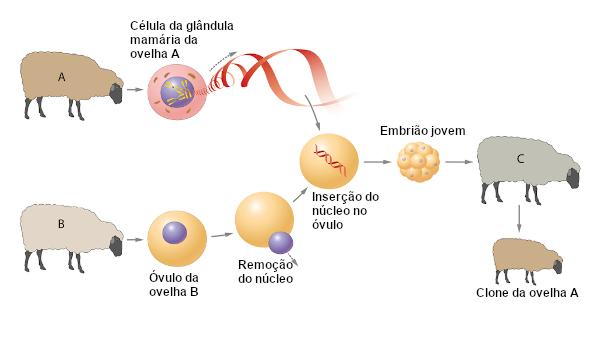THE cloning it is a process that can be defined, simply, as the production of copies of another individual. It can occur either naturally or artificially.
we talk about natural clones when we refer to individuals formed from asexual reproduction, as bacteria that divide and give rise to two identical bacteria. Humans can also produce clones naturally, this being the case with single-egg twins, which present the same DNA. The focus of our text, however, is the artificial cloning, in which somatic cells (all cells in the body except gametes are called somatic) are used to produce identical copies of an organism.
Read too: asexual reproduction — type of reproduction in which there is no genetic variability
Cloning of organisms
We call the cloning of organisms the technique capable of making identical copies of multicellular individuals from a single cell. The product of cloning is an individual called a clone, which is genetically identical to the organism that originated it. Undoubtedly, one of the best known cases of cloning organisms is that of sheep named Dolly.

Dolly, the first successfully cloned mammal
Dolly, a sheep, was the world's first successfully cloned mammal. To create Dolly, the researchers used a somatic cell, already differentiated, and managed to reprogram it so that it would become totipotent again, that is, capable of originating any cell type. To do this, the researchers transferred the nucleus of a cell from the mammary gland of a sheep to an enucleated egg (an egg without a nucleus). At that moment, the cell began to behave like a zygote formed shortly after the fertilization of the oocyte by the sperm.
After transferring the nucleus to the enucleated egg, this structure was inserted into the uterus of another sheep, which acted as a kind of surrogate mother. It may seem like a relatively simple process, however, for Dolly to be conceived, another 276 attempts failed.

Dolly was born on July 5, 1996 and died on February 14, 2003 by means of a lethal injection. The sacrifice was made as she suffered complications from a lung disease. It is worth noting that Dolly, despite all the success of the technique, presented a series of health problems, which could be the result - it is speculated - of cloning problems.
Reproductive and therapeutic cloning
The cloning that gave rise to Dolly is what we call reproductive cloning, which aims to generate genetically identical individuals. However, this is not the only form of cloning known, there is also the so-called therapeutic cloning. We'll explain each of these techniques in more detail below.
- Reproductive cloning: it aims to produce a new individual. The trained individual has the same genetic material, however, both behavior and appearance may not be identical, as environmental factors can also influence your appearance. development. This can be seen, for example, in identical twins, who are natural clones. Those who live closely with these people can easily find details that differentiate them, whether in appearance or behavior. It is noteworthy that reproductive cloning in humans is prohibited.
- Therapeutic cloning: unlike reproductive cloning, it is not aimed at creating a new individual, but at the formation of stem cells that could be used in the treatment of diseases, such as mal of alzheimer's and Parkinson's. Unlike reproductive cloning, in therapeutic cloning, the embryo is not placed in the uterus for the development of a new being. The use of embryos in the early stages of development, however, is not well accepted, being the technique prohibited, for example, in Brazil.
Read too:Genetic counseling — how to check the likelihood of a genetic disease occurring
Ethics and human cloning
Much is discussed about cloning and its limits. Would it be ethical to create a new human being identical to one of us? What is the purpose of this cloning? With all the health problems facing Dolly, would it be morally correct to subject a new individual to these risks? Most of the scientific community believes that reproductive cloning is not right, however, much is discussed about the so-called therapeutic cloning.

Therapeutic cloning has great potential to treat diseases, but we enter a delicate point when we talk about the topic: where does life begin? Despite using embryos at early stages of development, wouldn't they be a form of life? Many people believe so, which is one of the main reasons for the technique not being approved in several places. Another reason is the fact that therapeutic cloning could be an opening door for reproductive cloning.
What does the Brazilian law say about cloning?
According to the Law No. 11.105, of March 24, 2005, Cloning is considered a process of asexual reproduction, produced artificially, based on a single genetic heritage, with or without the use of genetic engineering techniques. Also according to the law, cloning for reproductive purposes is cloning for the purpose of obtaining a individual, and the therapy is that with the purpose of producing embryonic stem cells for use therapy.
According to article 6, it is prohibited to human cloning in the country. In chapter VIII, which deals with crimes and penalties, article 26 reinforces that those who carry out human cloning will be sentenced to two to five years' imprisonment and a fine.
Image credit
|1| Jordan Grinnell / Shutterstock.com
By Vanessa Sardinha dos Santos
Biology teacher
